
29 November 2024. Buwenge, Uganda. 16-year-old Moses sits alone in a pool of his own urine outside a community health outreach service held at a local high school. An epileptic and severely malnourished, Moses was brought to the outreach from Kamuli, which is over an hour away from Buwenge, by his mother Evelyn Mbwali who was worried about his lack of mobility. As a result of prolonged poor body positioning Moses has developed a curved spine and contractures in his knee joints making movement painful and limited. Education surrounding disability in rural regions is limited so Moses family was unaware of the physical therapy he should receive that would have provided flexibility and suppleness to his joints. The outreach provides oral medical treatment for those living with epilepsy in the region, however Moses' malnutrition means providing him with oral medicine wouldn't be recommended as his body would not be able to hold it in.

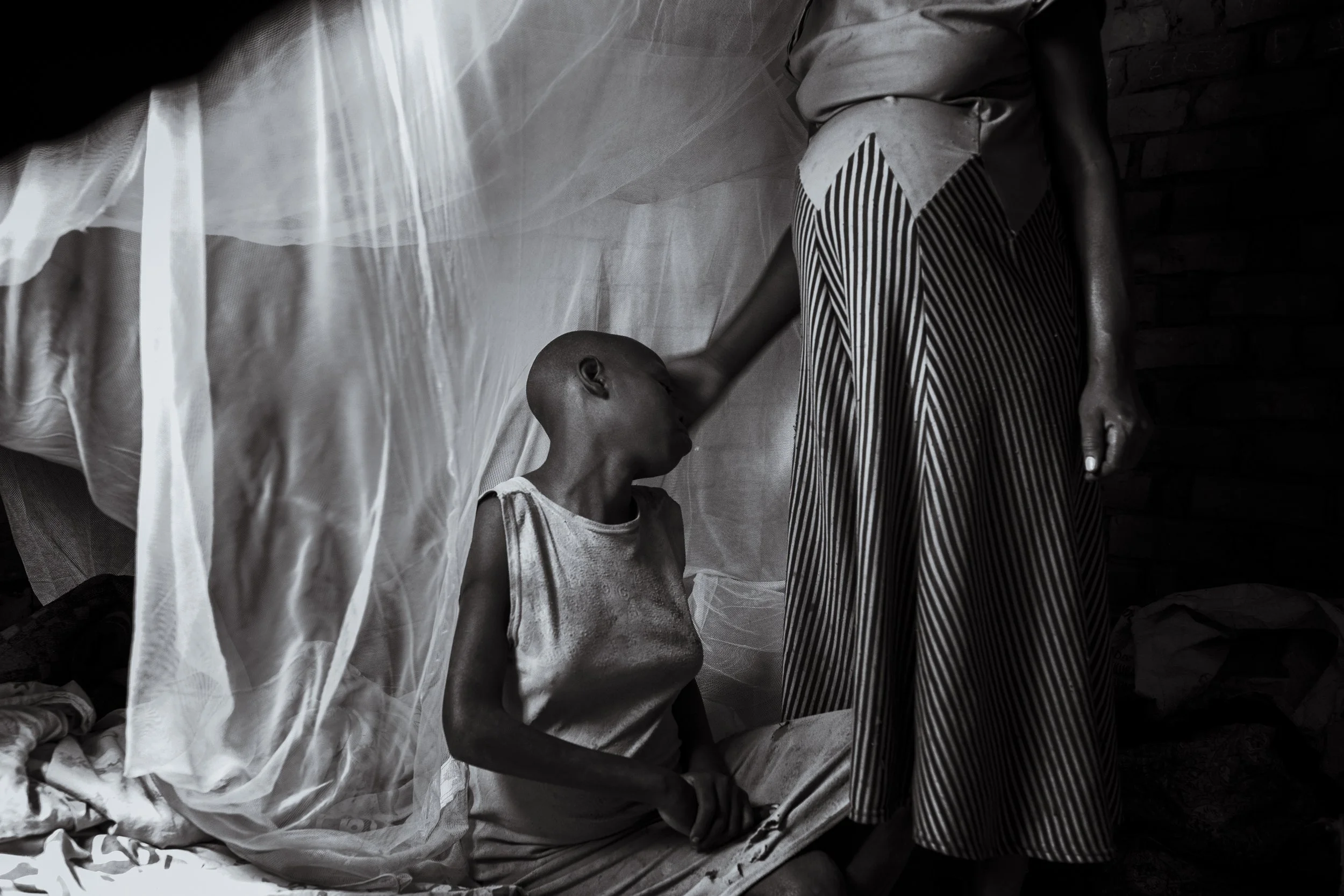
28 November 2024. Busede, Uganda. 13-year-old Janet Akwatulira is comforted by her mother Florence Nakecho in the bedroom they share with Janet's sister Jimbo. Janet and Jimbo both live with undiagnosed intellectual disabilities. Janet is currently seven months pregnant because of rape. The family know the attacker, a 37-year-old neighbour, who has fled the area. The family of the alleged rapist offered Florence a bar of soap and a bag of sugar each month until the baby is born as compensation. Florence agreed but the deal was then reneged. As a result, Florence went to the local police who informed her that if she continued to press charges against the rapist, she herself would be arrested on grounds of neglect.

19 November 2014. Gulu, Uganda. Former Lords Resistance Army (LRA) abductee Grace Aviro smiles whilst hidden behind a mosquito net.
Grace Aviro was abducted by the Joseph Kony led LRA and spent 14 years in the bush. Beaten, tortured and raped she was left with three unwanted children. Symbolic of how trauma affect’s Ugandan's, Grace never managed a smile, until she hid behind a piece of netting at her home. She now attends the Living Hope program in the northern city of Gulu, which provides a place to develop skills that enable women living with psychosocial issues and disabilities to start businesses, properly care for children and give comprehensive care for HIV. The program has enabled Grace to forgive her attackers psychologically but also learn skills that will help her to move forward in her life.
In a country with only 53 psychiatrists, the perception of mental health in Uganda ranges from being 'weak' to a devils curse, so seeking help is not common ensuring that assistance programs have to be creative when offering treatments.
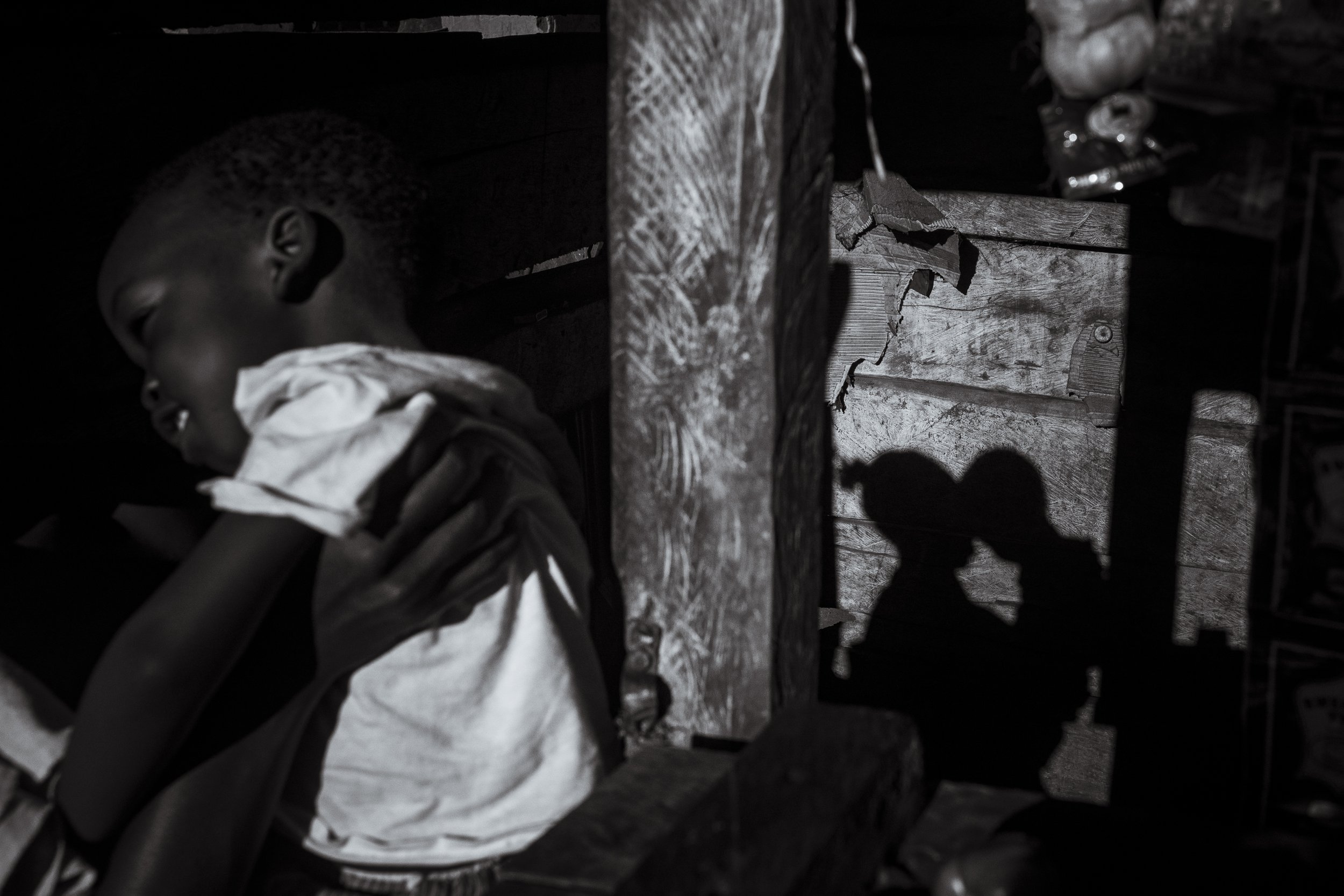
25 November 2024. Wanyange, Uganda. Margret Nakimbugwe shares a loving embrace with her two-year-old son Ali Nsimba at the roadside stall she operates. Ali lives with Cerebral Palsy and receives his weekly therapy at the Home of Hope facility in nearby Jinja. As a mother of a child living with disability Margret receives counselling from the social workers at Home of Hope, a local facility proving assistance to those living with disability. After vetting, she was given some interest free start-up capital from which Margret has been able to start a small business selling charcoal at the local trading centre. Despite living subsistently now, Margret is confident she can expand her business and provide for Ali's future needs.
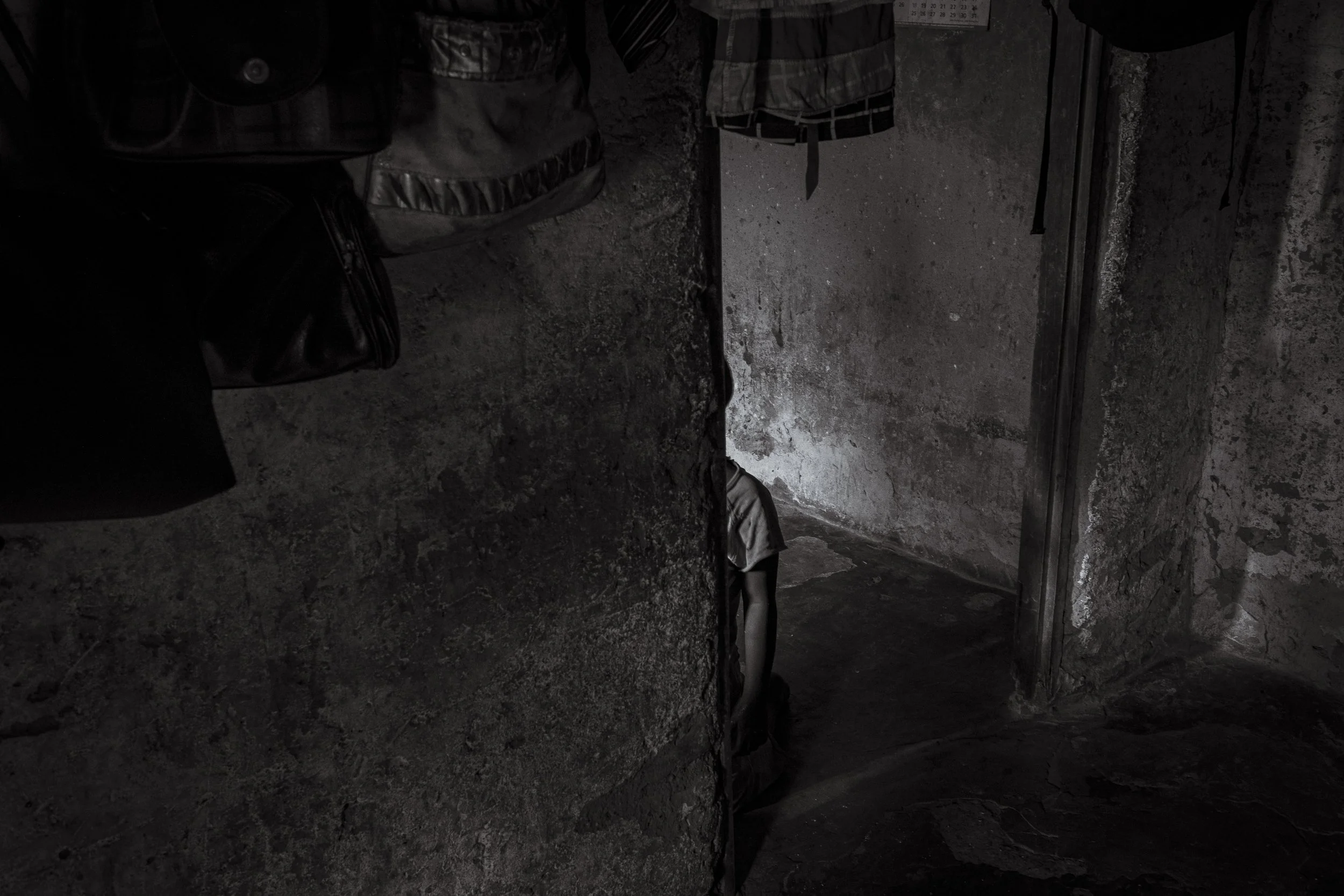
25 February 2020. Lugonjo, Uganda. Salma Kobusinge kneels alone in her Entebbe home. 9-year old Salma lives with Autism. She does not speak, has Epilepsy, Sickle cells, is deaf and blind in her right eye. Her mother, Nono Zubeda has told disability outreach worker Stephan Kabenge that she wishes Salma was dead. Nono has spent time in prison for leaving Salma unattended in the dilapidated two room house in a suburb of Entebbe. Salma's father denies the child is his and offers Nono no assistance in the home or financially for Salma's medications. Nono has resorted to the services of a local Witch Doctor, but he has made no difference to their lives.
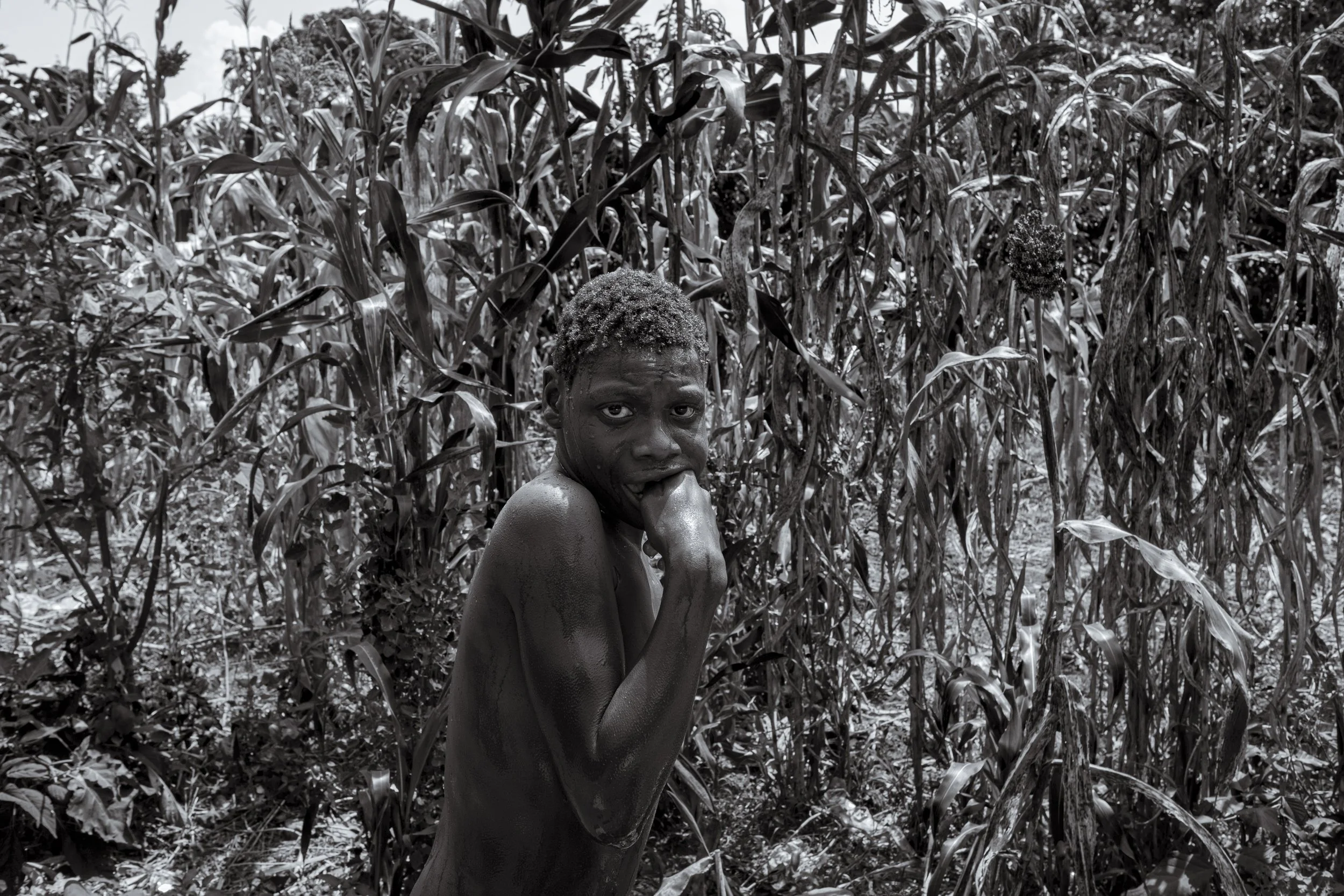
19 July 2023. Nabwigulu, Kamuli District, Uganda. Perez Mwase cowers in the family maize field after being bathed by his mother Lovinsa Namwebya.
19-year-old Perez lives with severe, category four, autism. Lovinsa tried for years to have her son’s condition diagnosed. Unable to deal with his aggression and hyperactivity, his parents tied him to a tree for 11 years. He was fed and toileted in the same place until late evening when he would join the family inside. Following the death of his father from suicide, Lovinsa struggled to care for Perez alone and he was moved to the Amaanyi Centre, a home and school for children with intellectual disabilities run by NGO Embrace Kulture, a two-hour drive away in Entebbe. While there he was formally diagnosed with severe, category four, Autism.
In November 2017 the family instigated a case challenging the Ugandan government and the Buyende Local Government with failure to provide early detection, rehabilitation, and habilitation services at the primary health care level for a person living with Autism. In a landmark decision in March 2022 the court ruled in favour of Perez on all counts. The court found that the government’s failure amounted to a violation of his human rights; his right to health, right to equality and freedom from discrimination, and his right to human dignity provided for under the 1995 Constitution of the Republic of Uganda.
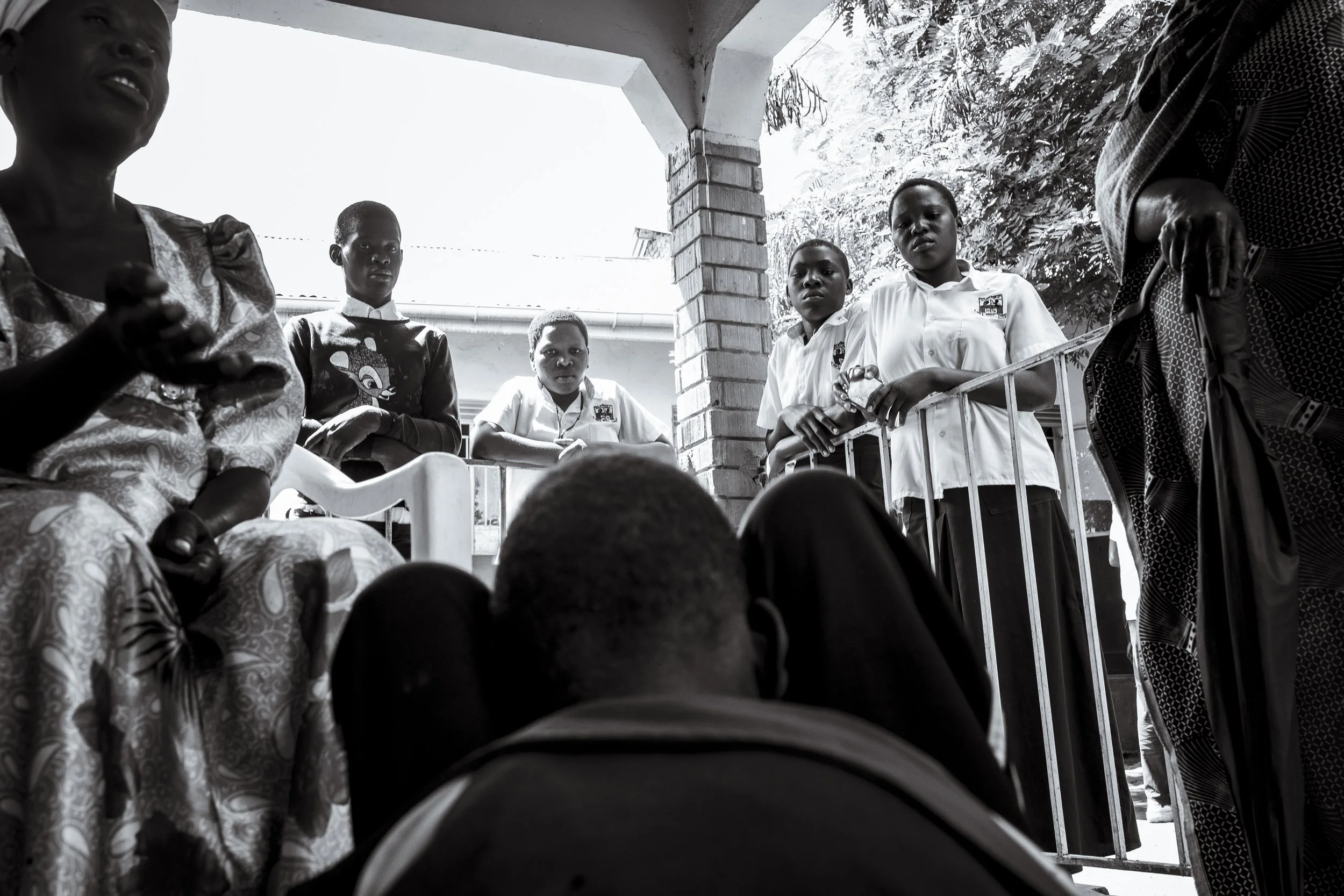
29 November 2024. Buwenge, Uganda. 16-year-old Moses is ogled by local students as his mother, Evelyn Mbwali explains his story to a health worker at a local outreach clinic. Moses was brought to the outreach by his mother who was worried about his lack of mobility. Severely malnourished, and epileptic, because of poor positioning he has developed a curved spine and contractures in his knee joints. Community awareness and acceptance surrounding disability, whilst increasing, is still at a level whereupon there is a great deal of stigma attached. Families are often ostracised from their communities; parents will abandon children born with disability and in some cases 'mercy killings' are performed. Local community-based organisations and NGO's work tirelessly on educational programs that look to dispel these myths, incorporating information sessions into outreach programs in the hope the knowledge will be taken back to local villages and the information shared.

23rd July 2023. Lira Village, Soroti District, Uganda. Esta Aruto, 35, Solomon Aebuiju, 50 and Marcay Etagu, 65, who all live with an intellectual or physical disability listen to Pastor Joshua Ijala's sermon in Sunday mass.
Uganda, colonised by the British, is a predominantly Christian society with 85% of its citizens adhering to the Christian faith. 12% is Muslim while the remainder follow indigenous beliefs, Judaism and Hindi. Despite these religious beliefs there is a cultural taboo surrounding psychosocial and intellectual disability, with most believing those living with to be cursed or possessed. Awareness surrounding the falsehood of these myths is growing at the community level in the Soroti region due to the forward thinking of religious leaders like Pastor Joshua. Joshua and his church have taken in Esta, Solomon and Marcay, and given them working roles within the church community to educate the parish that those living with mental health and intellectual disabilities are not cursed, can lead fulfilling lives and be positive members of the wider community.
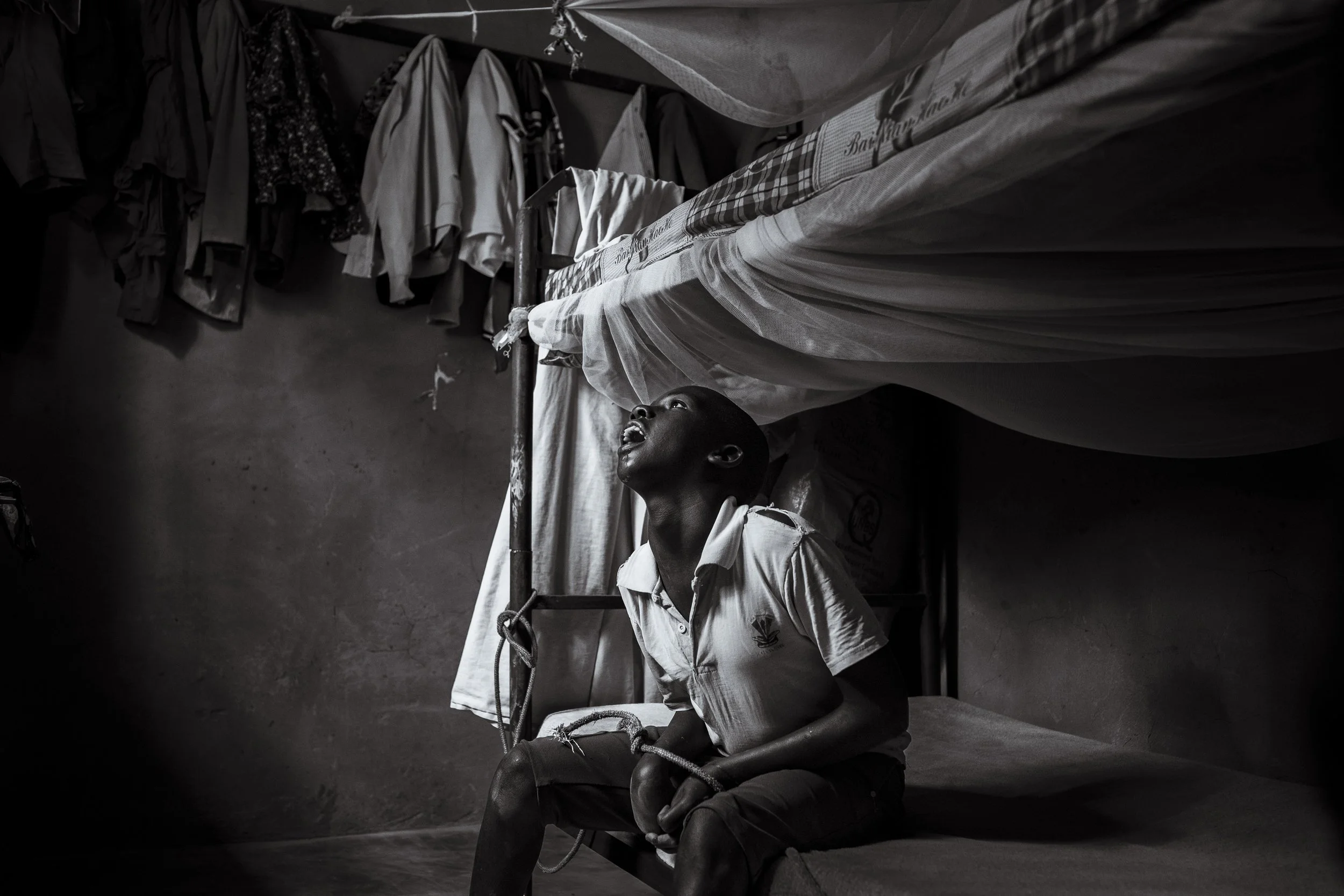
5 December 2024. Omalera, Soroti District, Uganda. 17 -year-old David Emwodu sits hands bound by a rope and tied to the uprights of the bunk bed he shares with his brother.
David lives, undiagnosed, with an intellectual disability which can see him become violent. As his parents have moved out of the village to pursue work so they can provide for David and his two siblings, the children are cared for by their grandmother Grace Ayaro. David can become violent, especially toward his eldest brother, and when this occurs they tether him to the bed.
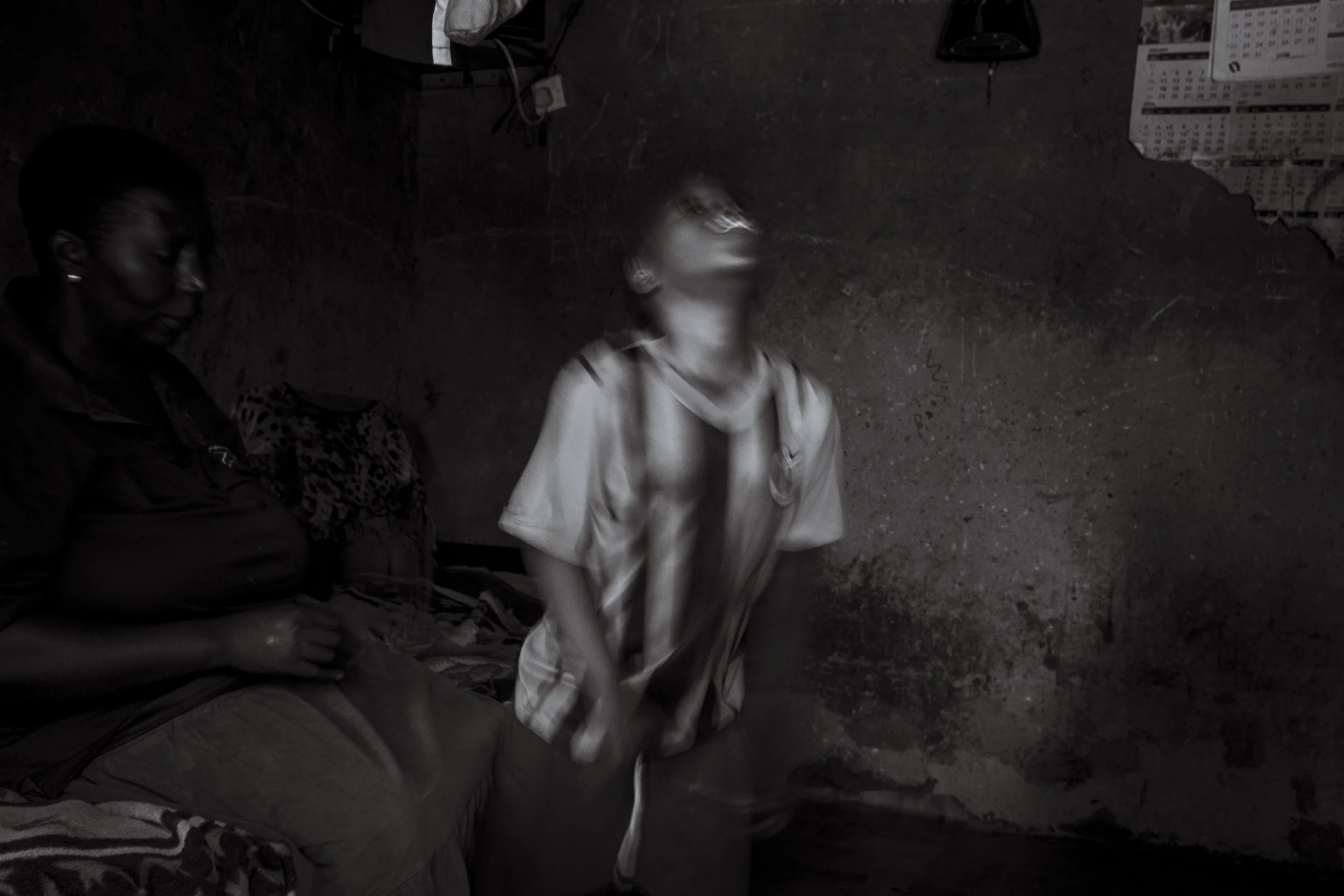
17 July 2023. Lugonjo, Uganda. Single mother Nono Kabenge watches on as her 11-year-old daughter Salma stumbles towards the light of an open doorway.
Salma lives with epilepsy, Sickle Cells, Autism and is non verbal, partially blind and deaf. Salma's head is covered in scars from injuries sustained while falling and crashing into walls. In the past Nono was known to leave Salma locked away alone, resulting in many of the falls, but in the past two years Nono has worked with the small NGO Embrace Kulture to learn about her daughters disabilities. They have debunked the myths surrounding disability and she has learned that leaving her daughter locked away alone is an abuse of her rights. She has also learned about self care and that to visit a psychologist for her own mental health issues should not be seen as a weakness.
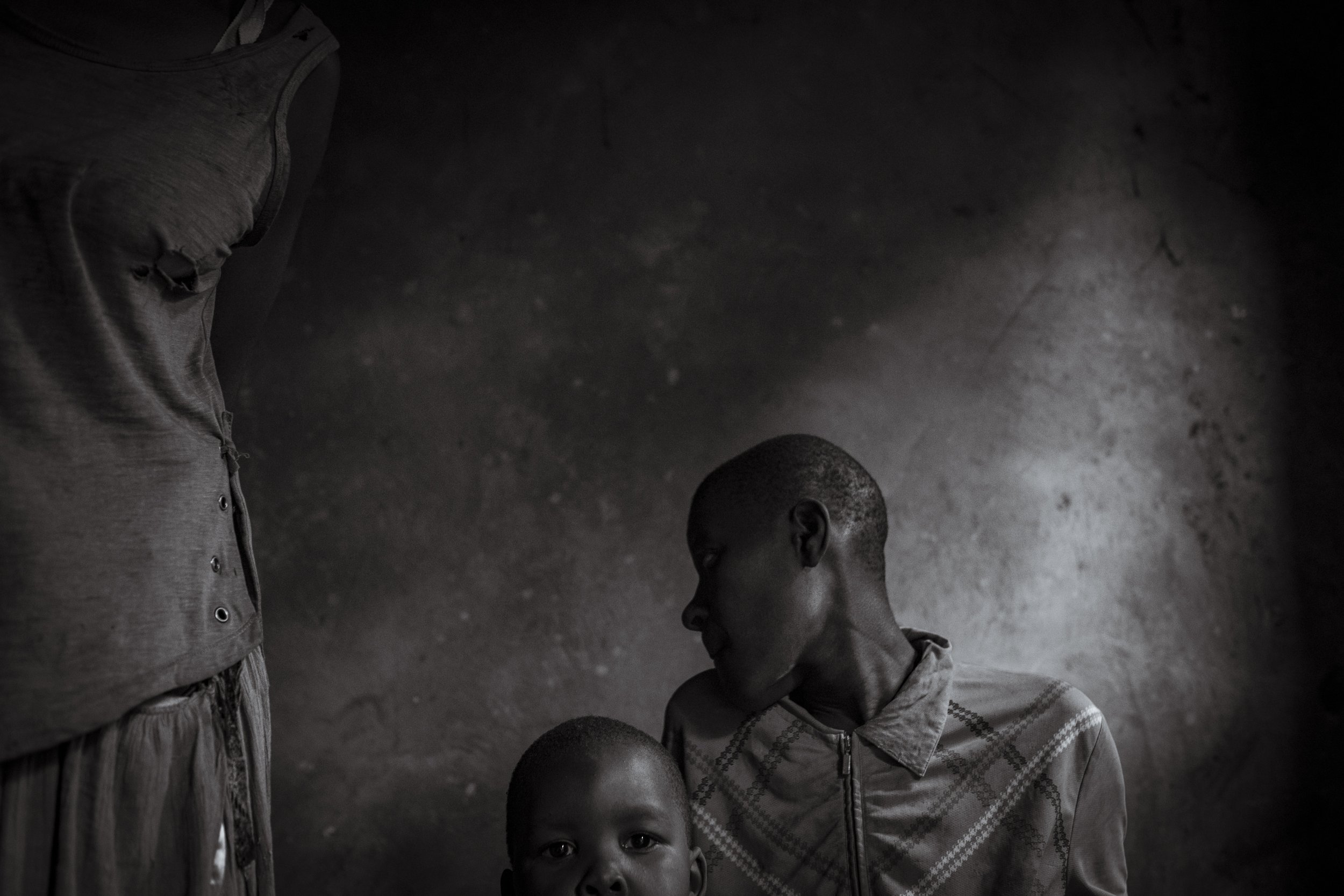
25 July 2023. Namazala, Jinja District, Uganda. Four-year-old Edwin Nangobi stares into the camera as he sits with his mother, 20-year-old Katherine Muwunguzi (r) and Grandmother Joy Nangobi in the room Katherine shares as a sleeping quarter with bags of cassava.
'Kat' was raped repeatedly by a neighbour at a young age resulting in the pregnancy and birth of Edwin four years ago. Kat lives with an un-diagnosed intellectual disability and is unable to comprehend that Edwin is her child. This family dynamic means that Joy raises Edwin, but not as her own. She is determined to teach Edwin that Kat is his mother.
“We are trying our level best to try and create a relationship between the child and his mother, but she doesn’t have anything that she cares about given her mental situation. We always tell this child [Edwin] that no matter the condition of your mother, she is your mother. Every time we try to ask him, just to find out, if he remembers who his mother is, and if you ask him, he says - ‘the one who is mentally disturbed is my mother’.”
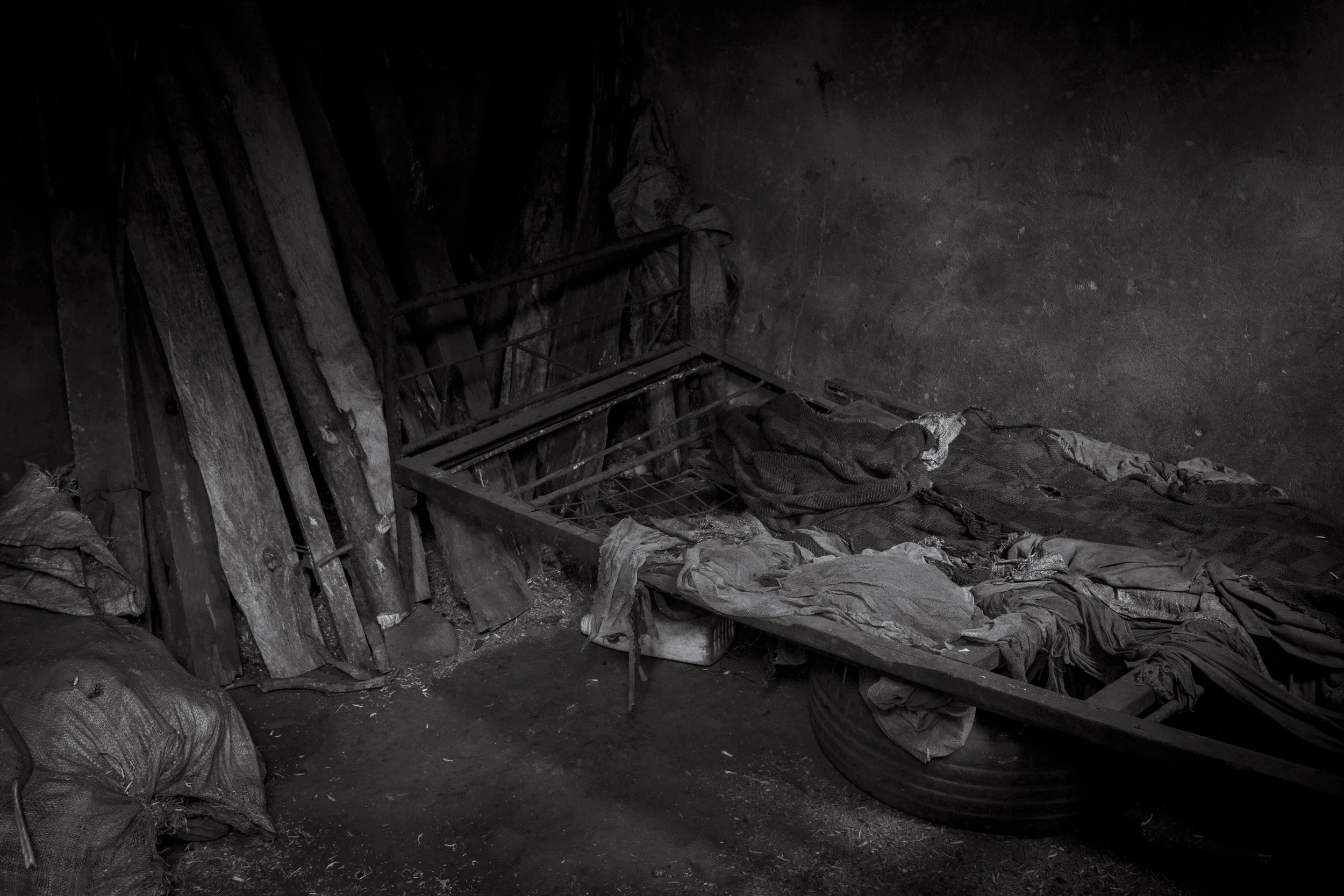
25 July 2023. Namazala, Jinja District, Uganda. The sleeping quarters of the victim of multiple rape, 20-year-old Katherine Muwunguzi.
'Kat' was raped constantly by a neighbour at a young age resulting in the pregnancy and birth of a son Edwin four years ago. Kat lives with an un-diagnosed intellectual disability and is frequently violent towards her mother Joy Nangobi. One in four adults with a psychosocial or intellectual disability in Uganda have been the victim of sexual assault.

25 November 2024. Lake Victoria, Uganda. On a local road adjacent to Lake Victoria two goats, surprisingly untethered, roam through a grassy field. Seen as an easy source of producing income and milk, they are fiercely cared for and almost exclusively live their life tethered.

4 December 2024. Omalera, Soroti District, Uganda. Local witch doctor Robert Apedu poses for a portrait in his clinic. As witch doctors comprise around 77% of the health services in rural areas they offer a more convenient alternative to the cities health facilities and medicines.
Apedu believes in his craft and wishes the government would recognise witch doctors and traditional healers as a genuine supplier of health services.
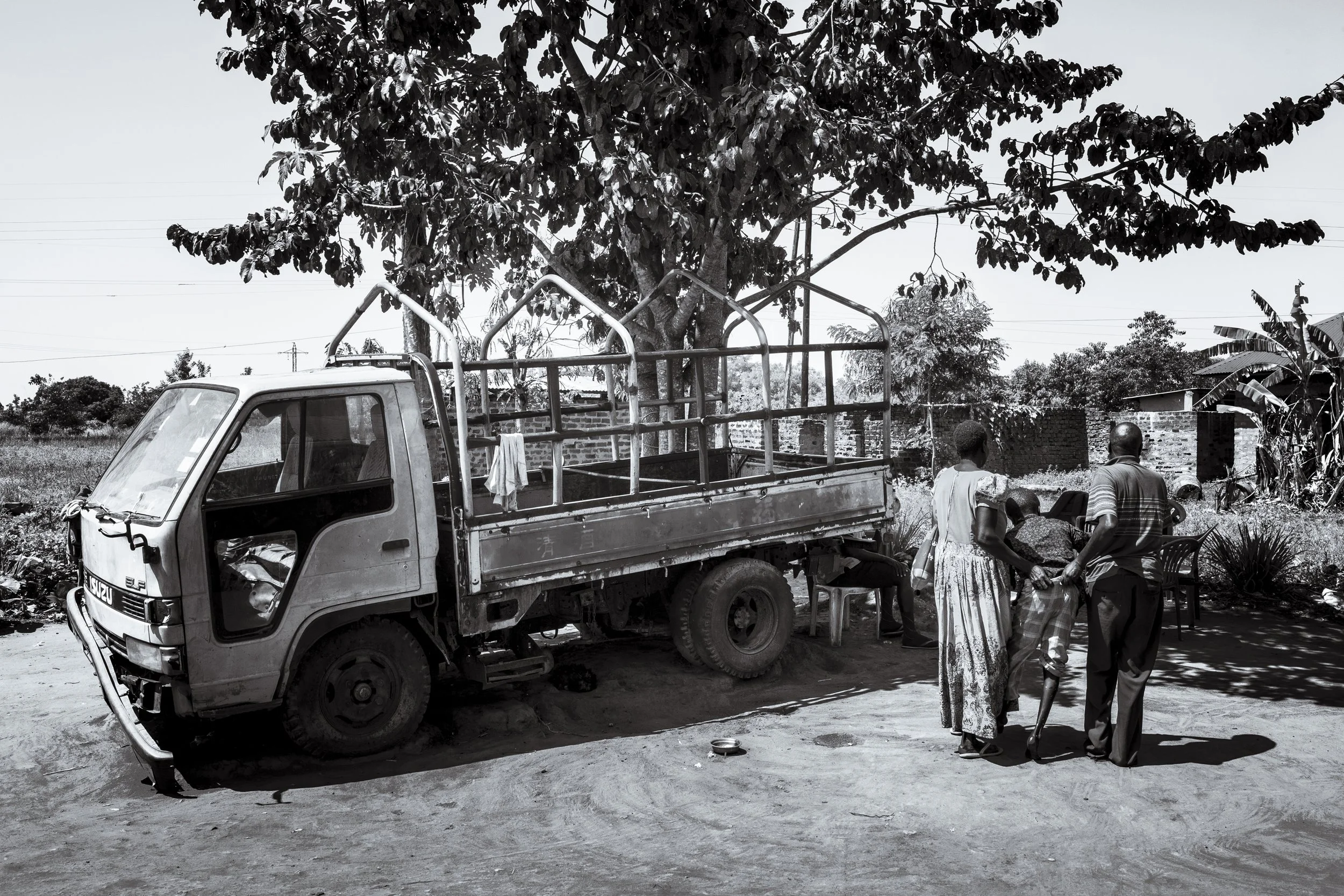
4 December 2024. Omalera, Soroti District, Uganda. Local Witch doctor Robert Apedu and Florence Aguro carry Florence's son Noah Oyara into the shade after Robert treated Noah. Noah has no use of his legs and also lives with hydrocephalus. Robert treated these conditions by rubbing a paste of water and plant matter into Noahs skin. While he is well known in the area as a witch doctor, he understands the negative connotation surrounding his profession so like many others he refers to himself as a 'traditional healer or herbalist'. Florence is well educated around Noah's conditions yet her lack of support means she cannot access treatment in the nearby Soroti Government hospital. She takes Noah to Robert for treatment as she says 'what harm can it do'.
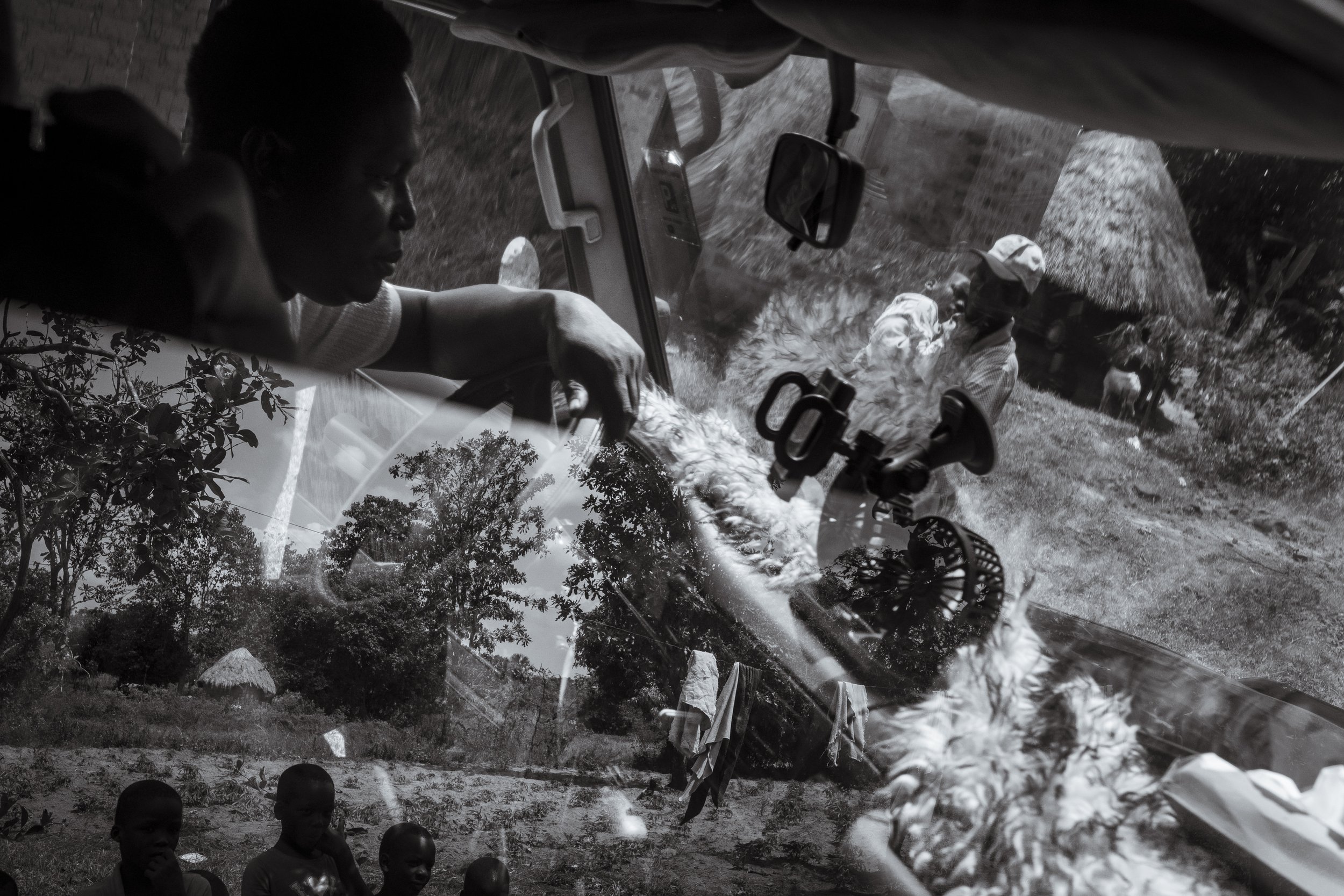
2 December 2024. Oukot, Amuria District, Soroti. Local children watch on as Simon Okurut carries his son Paul Oribo, who lves with Cerebral Palsy, to the Landcruiser Fred Alimet from local charity Cherish Ikoku Uganda uses as a makeshift ambulance. Many families of those that live with disability live isolated from the major health facilities. Oukut is a farming village of 90 households with a known five children with Cerebral Palsy, one with Hydrocephalus and others who are hidden by their families. It is 31 km away from Soroti and its main government hospital so the only means of emergency transportation is the local Boda Boda (motorcycle) riders. This is a costly and dangerous way of getting a child to hospital.
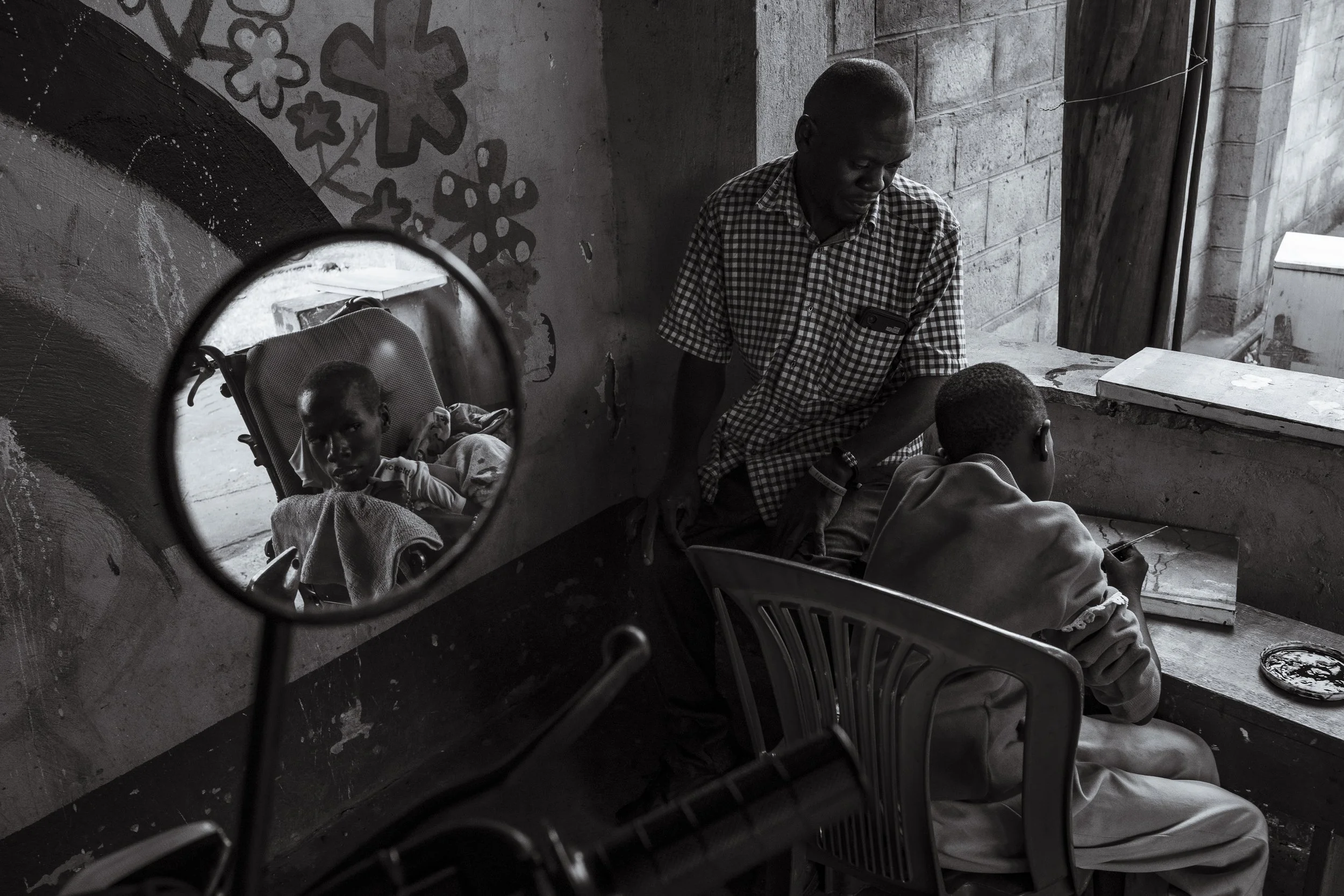
27 November 2024. Bugembe, Jinja District, Uganda. Daniel, 18, looks on as Mary works on a painting in a weekly skilling program held at Home of Hope. The skilling program is run three times a week where the children learn various forms of art and craft from local artist and disability advocate Joseph. The aim is to provide the children with skills that promote independence after they reach the age of 18 and legally have to move on from the Home of Hope. As Daniel has turned eighteen he will be moving to a newly constructed purpose built assisted living home in nearby Buwenge but until the move the home is forced into non-compliance.
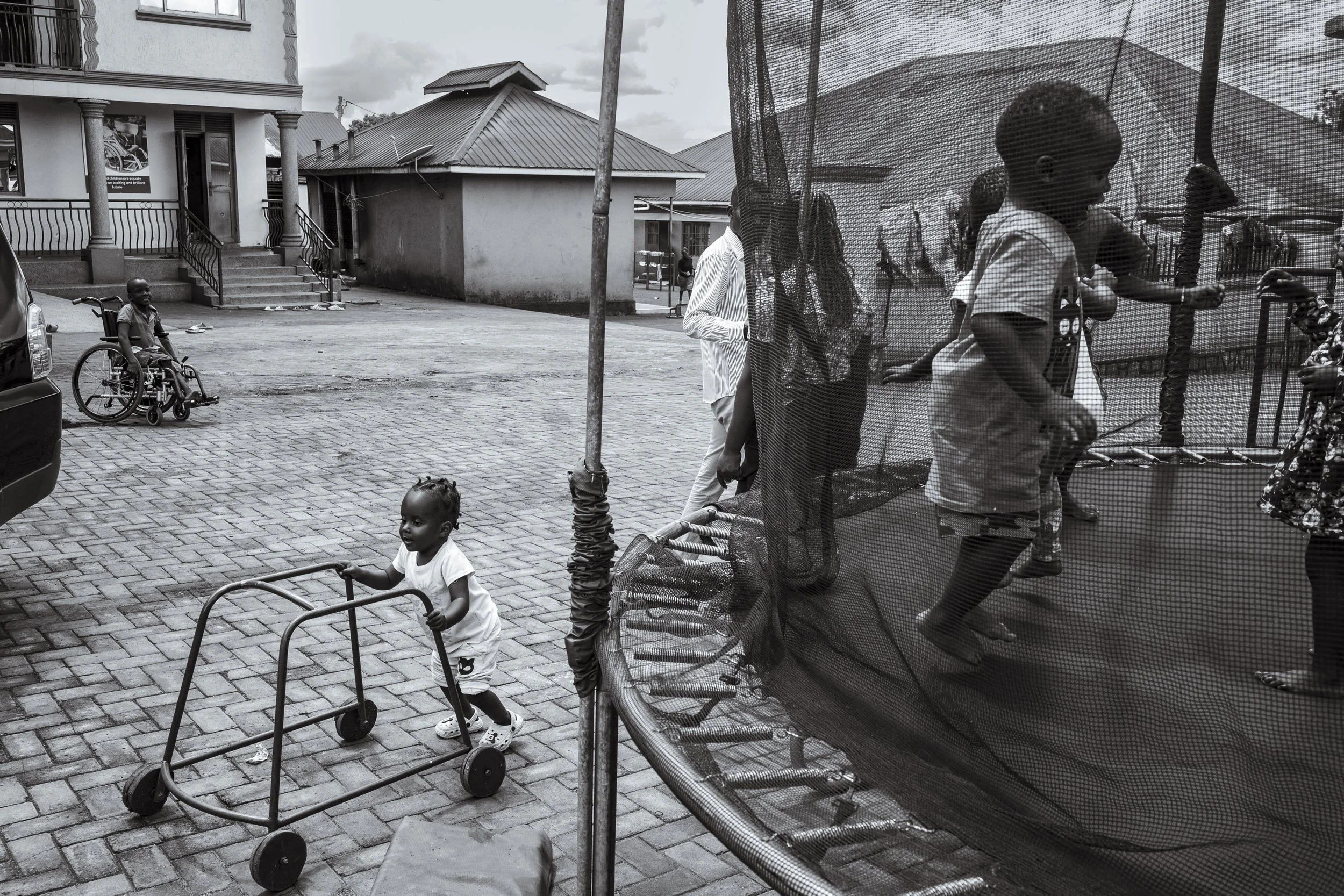
26 November 2024. Bugembe, Jinja District, Uganda. As two-year-old Mildred, who lives with Down Syndrome, walks assisted by a walking frame, children of staff play unassisted on a trampoline at the Home of Hope. Every Tuesday is therapy day at the Home for children from the region living with disabilities. Approximately 25 parents bring their child on a first-come first-serve basis whereupon the children receive therapy from a physiotherapist and Occupational Therapist, Eddie Opio (seen here speaking with Mildred's mother Ida). The day provides the children with a required service free of charge, but has also created a community for parents of children living with disability to speak to others who are living with similar issues.
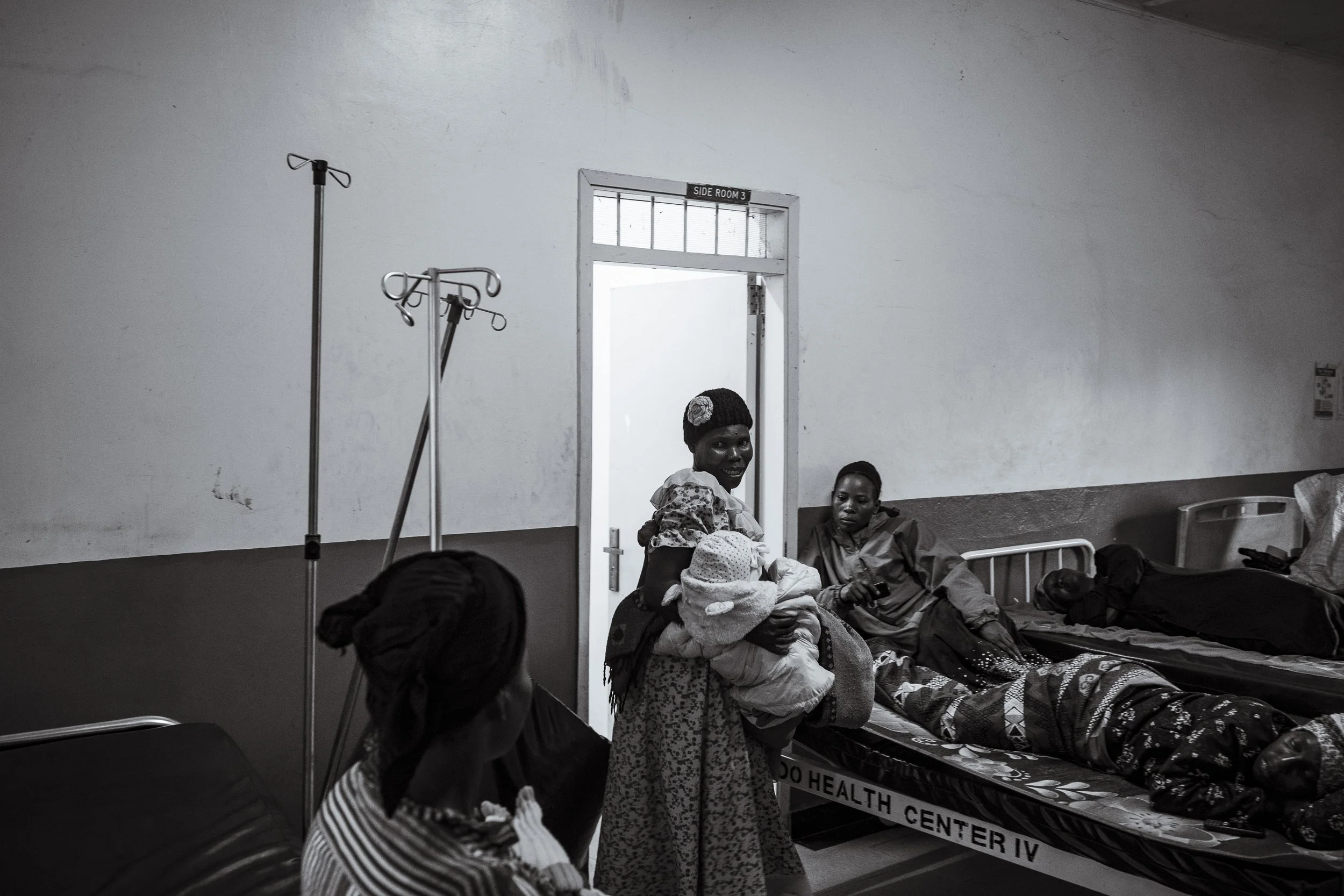
27 November 2024. Budondo, Uganda. At the Budondo Government Hospital, Margret Awebwe carries her one-year-old Elaija Talemwa, who lives with Cerebral Palsy from his monthly therapy session with physiotherapist Alex Kamulegeya. The lack of prioritisation from Government given to disability is clearly evident at Government run hospitals. Whilst the services offered are free, the therapy Margret and Elaija attend is confined to a small, unsuitable, two by three metre room adjoining a ward whereby other patients can watch, reducing privacy for the parent and child.
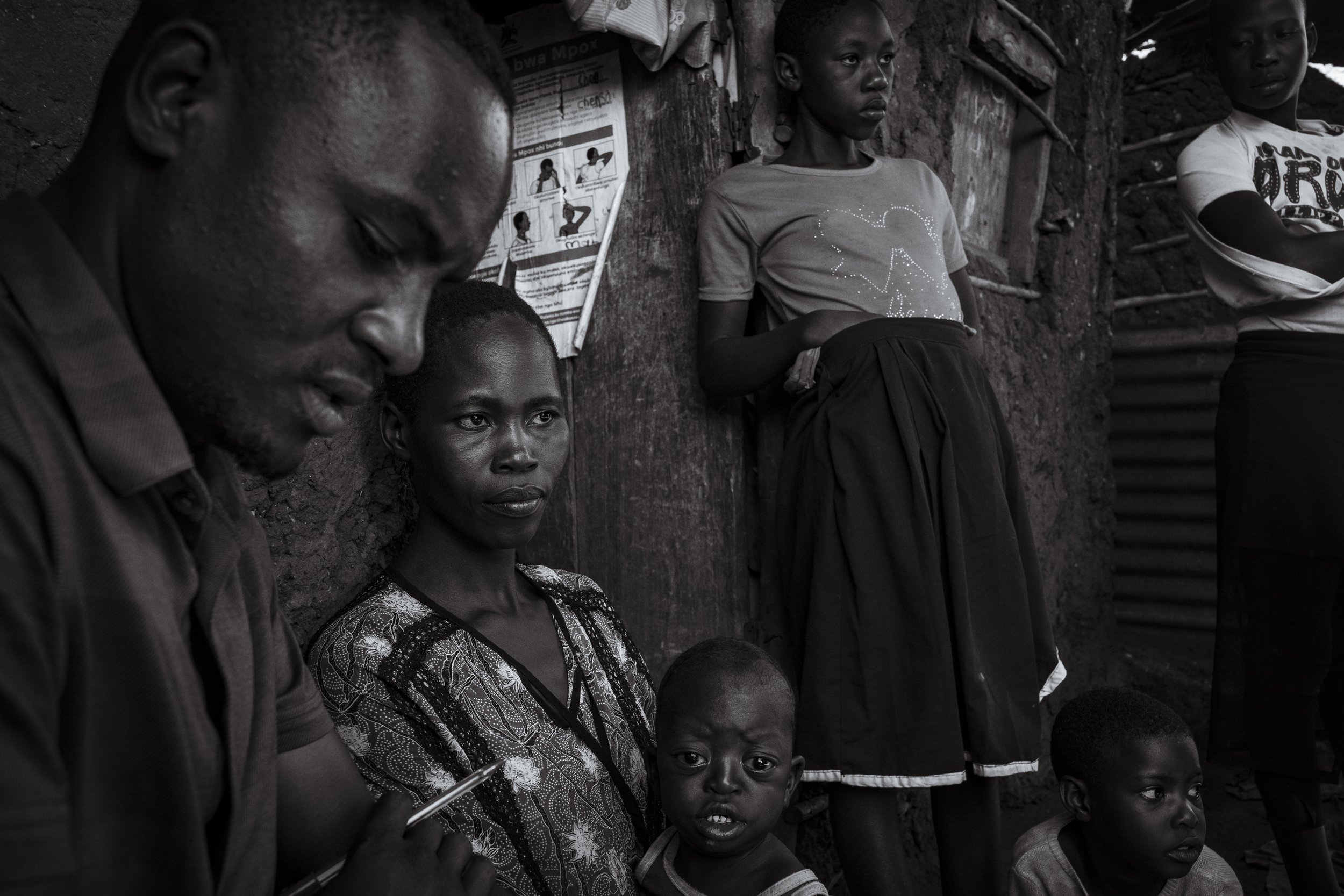
25 November 2024. Wanyange, Uganda. Near the shore of Lake Victoria social worker Stephan Kigozi conducts an outreach meeting with Olivia Mugala. Olivia's four-year-old son James Mugabe lives with Down Syndrome. As a result of her husband abandoning the family, Olivia attempted suicide and was referred to the nearby Home of Hope- a facility which provides various services to those living with disability- by a concerned neighbour. After receiving counselling and social support, Olivia has been able to start a small business selling local fish supplied by local fisherman and is looking to expand into fresh produce. Part of Olivia's social support includes education around disability and Down Syndrome, information which is not administered by official channels and is left up to smaller organisations to provide, meaning that the reach is limited and therefore reactive rather than preventative.

25 July 2023. Bugembe, Jinja District, Uganda. A young boy with Hydrocephalus is seen illuminated by window light on the floor at Hope of Hope, Jinja, Uganda.
The Home of Hope houses over 90 children who have been abandoned due to their intellectual disability. Peter Osire, the programme coordinator at Home of Hope, says that there is a disconnect between the constitutional rights of those living with Intellectual disability, and how those rights are being met. He says the Government should be taking more responsibility for services for people living with psychosocial and intellectual disabilities.
“They don't seem to care. The government knows what its responsibility is - to do something - but they don't do it. You know, it should have been the one to take the lead, but it leaves it to other key players.
“It's something that is a fault because these are services [services offered by Home of Hope] that these children are supposed to get from the government.”
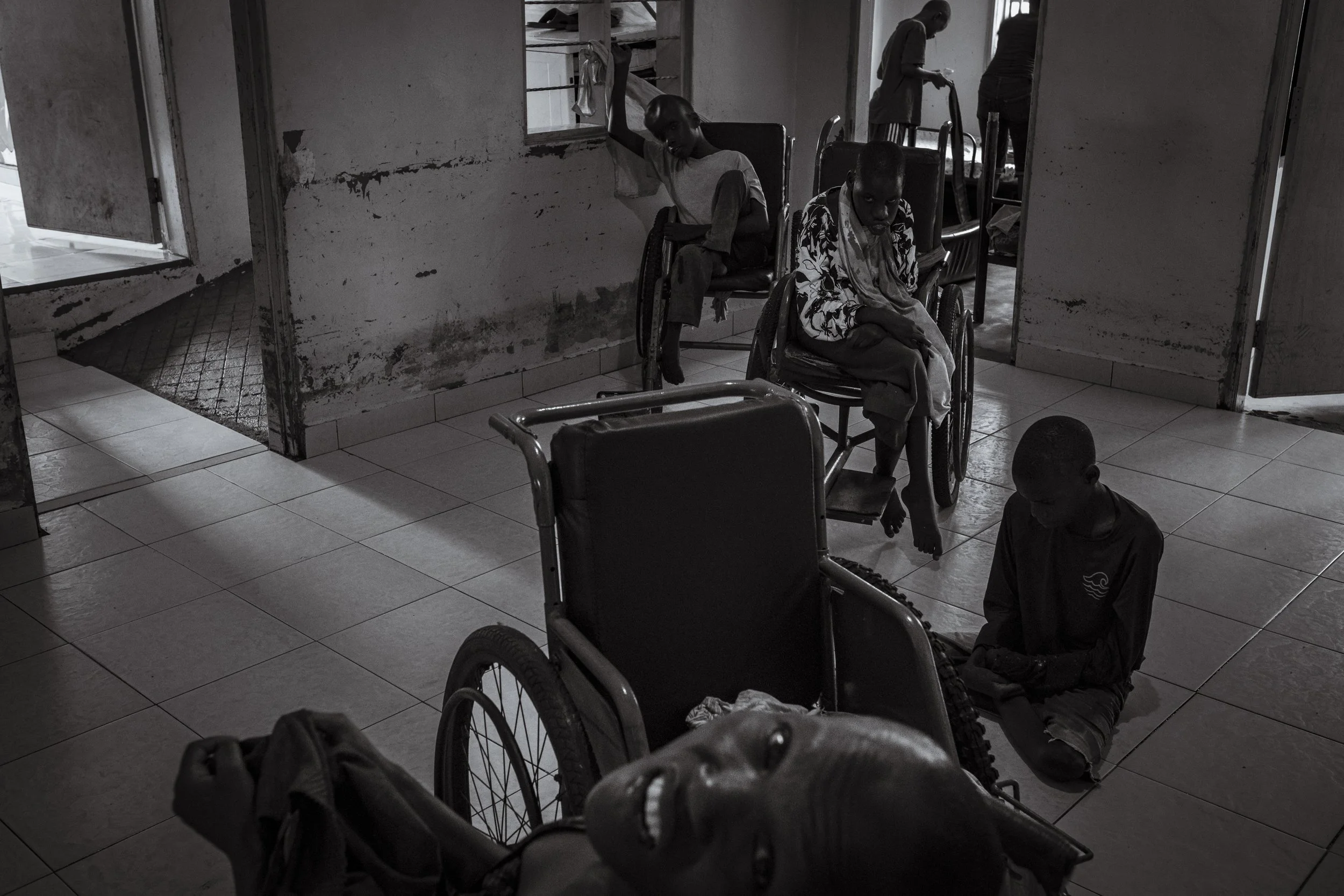
25 July 2023. Bugembe, Jinja District, Uganda. Teenagers living with conditions including Cerebral Palsy and Hydrocephalus await rehabilitation treatment in the therapy room at Home of Hope, a home, rehabilitation centre and hospital for abandoned children who have intellectual and physical disabilities.
Home of Hope houses, educates and rehabilitates about ninety children and young adults with no financial assistance from official channels. Government regulation states that is not permitted to house children when they turn 18 but it continues to do so because many have been abandoned by their families. Government policy means they are to be found supported homes - homes with willing and able carers- at age 18 but without financial assistance this is impossible forcing the centre into non-compliance.
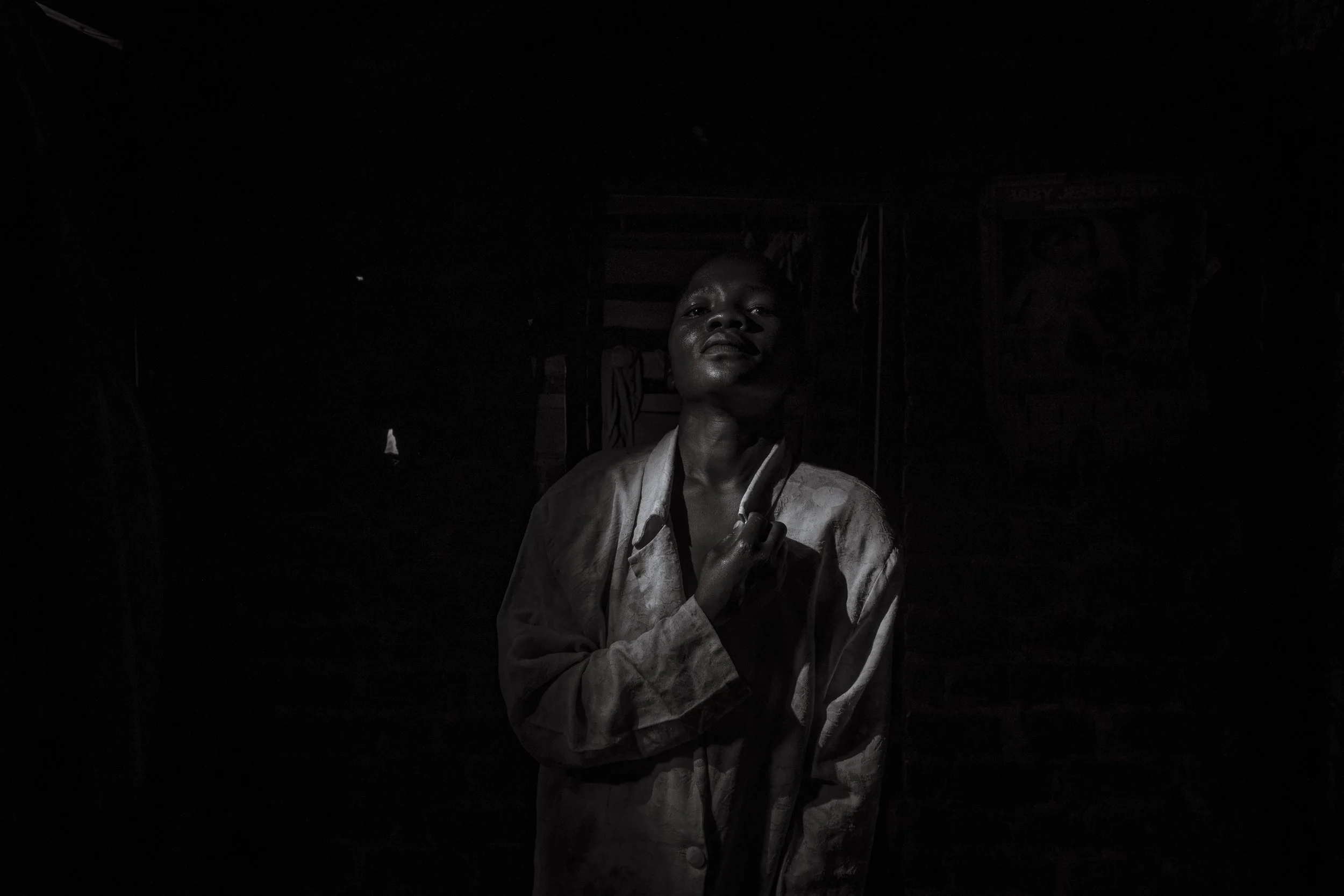
25 July 2023. Lukonko, Jinja District, Uganda. Winnie Bamulobeireki stands proudly in the home of her father.
The 25-year-old lives with epilepsy and her mental health has deteriorated to the point where she was unable to finish school. She is an easy target for local men, who have enticed her into the sugar cane fields that surround their home with promises of gifts and sweets. One of the many rapes resulted in the birth of a child last year. With no means or ability to raise the child, the baby was taken to an orphanage. Winnie’s father, Kalisti, knows the man who raped her but he will not pursue justice for Winnie as the man is destitute and ‘has nothing to give them.’
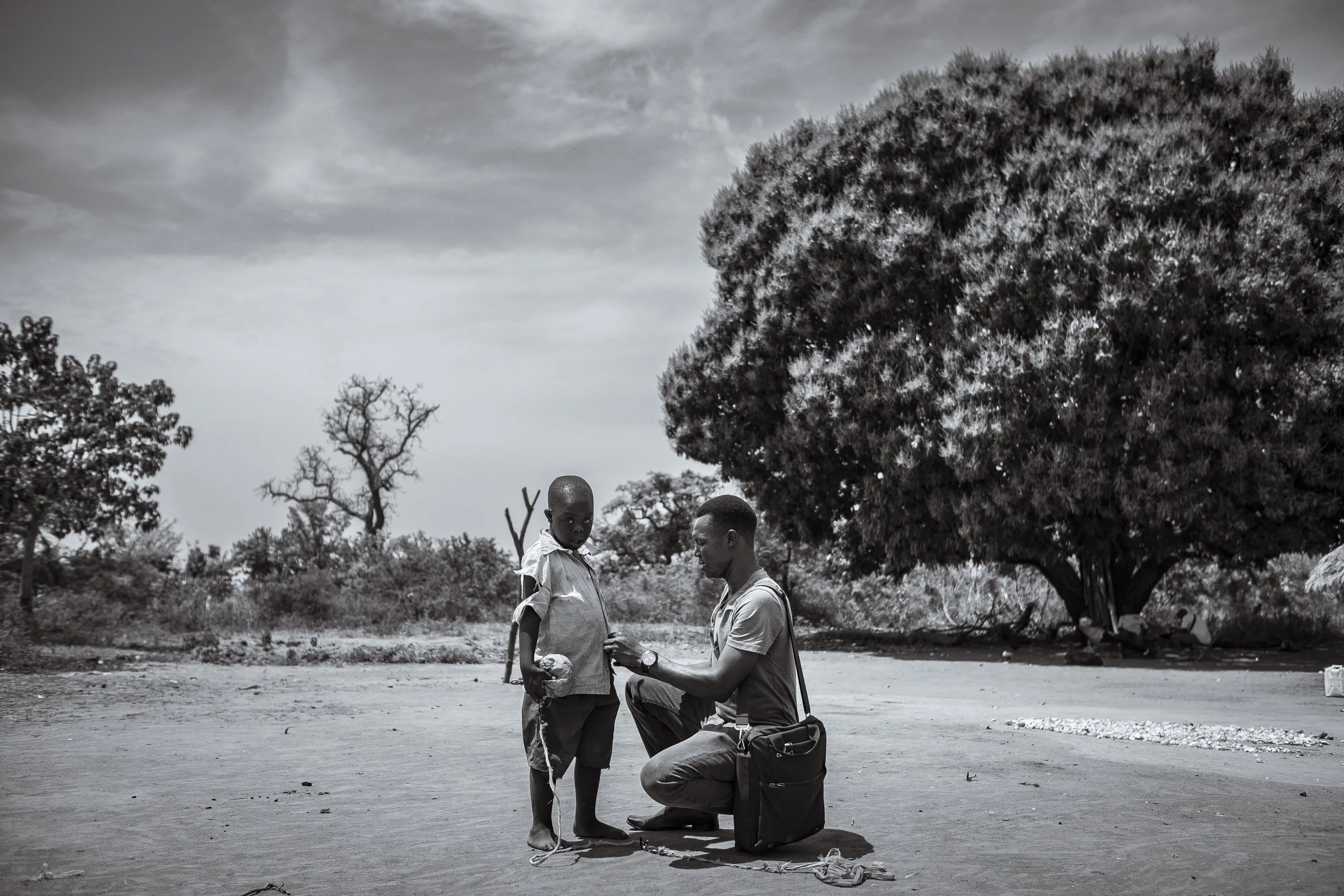
27 February 2020. Obur, Soroti District, Uganda. Outreach worker Pastor Fred Alimet buttons up thirteen-year-old Silus Odii's shirt after releasing him from his restraint.
Silus, who lives with Down Syndrome, regularly gets tethered to a wooden crate inside his families single room home. His mother and father- Elizabeth Iloi and Joram Odii- are subsistent farmers, growing and selling Cassava and are often away from the family property. In the past when left alone and free to wander Silus has been assaulted and abused by neighbouring villagers because of his disability, so Joram and Elizabeth now tether him inside for his own safety. The act of chaining or tethering a child with mental health or disability issues is often not out of malice, but to restrict any harm from uneducated members of the community.
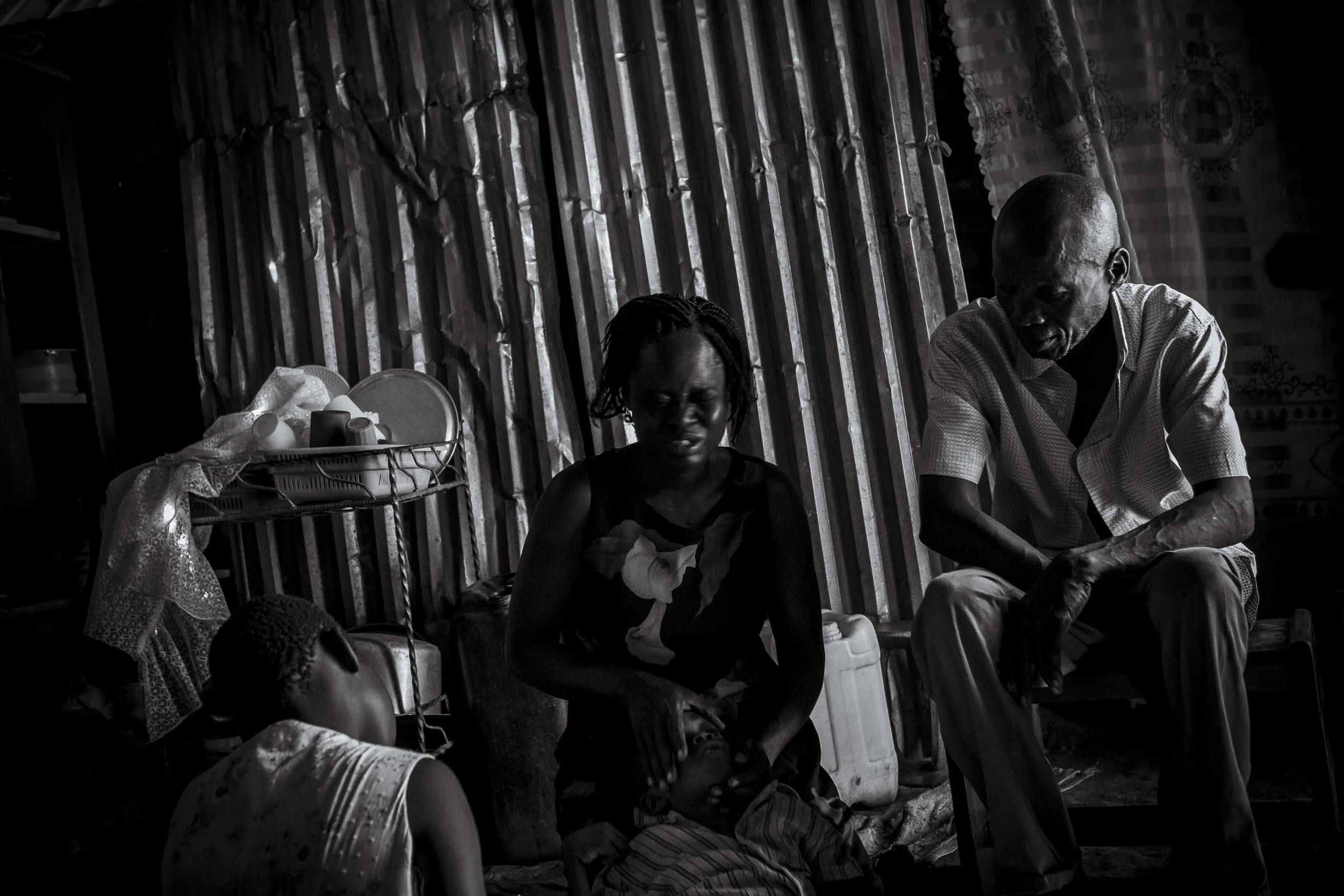
29 February 2020. Ojwina, Lira District, Uganda. The mother of seven-year-old Ezra Moro, Ages Nangobi breaks down whilst explaining her families recent experiences raising a child with a disability.
Ezra was born healthy. At age four he began to show signs of disability, turned in feet and loss of speech. Within three years he was completely disabled. Ezra hasn’t been formally diagnosed but his mother, Agnes Odoch believes he has Spastic Diplegia, commonly known as Cerebral Palsy. Agnes had a child die at age nine who also suffered from Cerebral Palsy. Her family has had its home destroyed by a mob who believed Ezra and the family to be cursed and were bringing bad luck to the village. They now live only ten metres away in a makeshift house constructed of corrugated iron sheets and mud bricks. The family are still verbally and physically abused by neighbours, are stoned and have their home defecated on. Due to these cultural beliefs, Agnes cannot provide for her family and as a result Ezra is now severely malnourished.
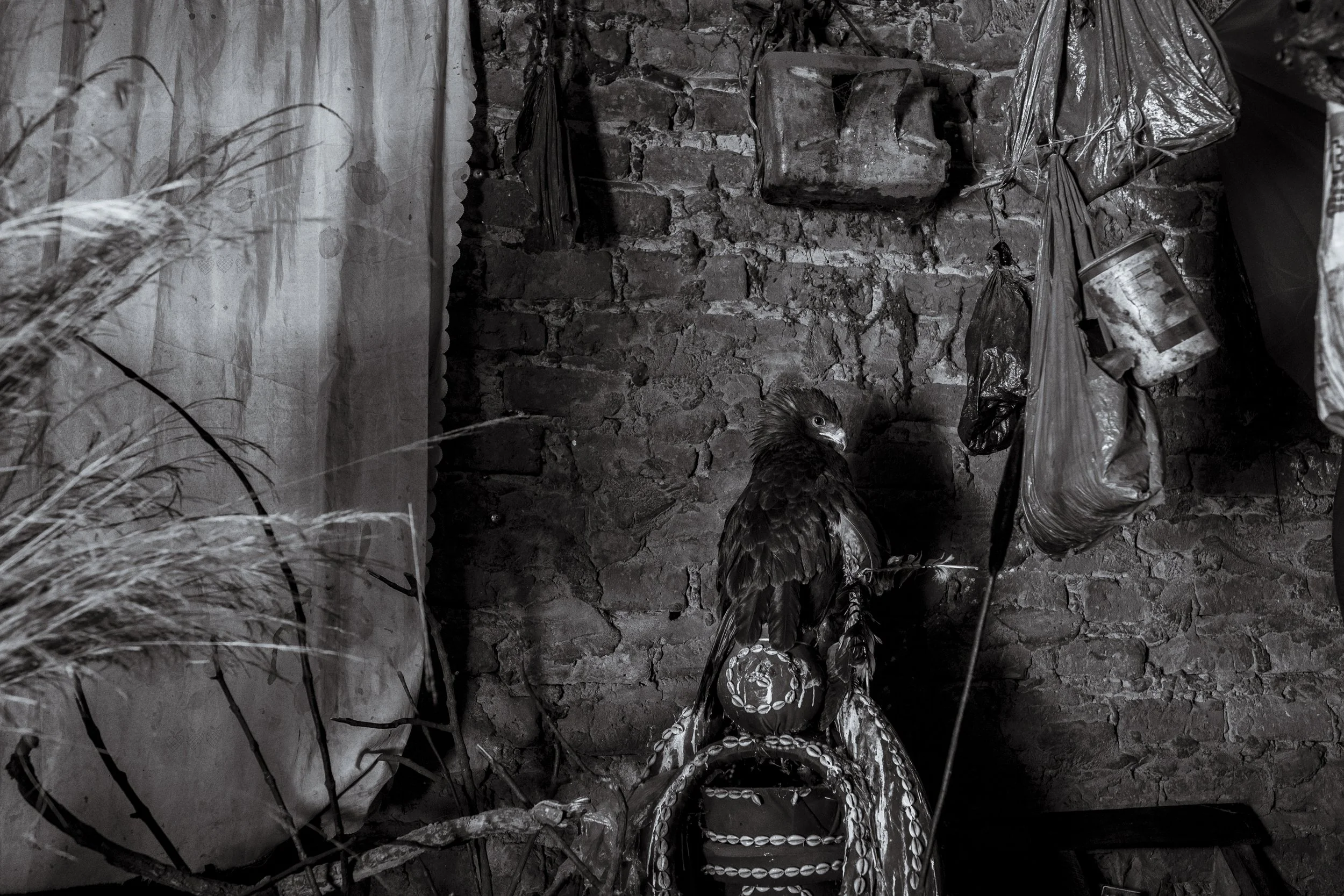
4 December 2024. Omalera, Soroti District, Uganda. At local Witch Doctor Robert Apedu's clinic, a disabled Eagle perched on a basket surveys the room. Apedu has severed the Eagles wing to its ulna joint and uses its feathers to treat "crazy". By this he is referring to psychosocial and intellectual disability.
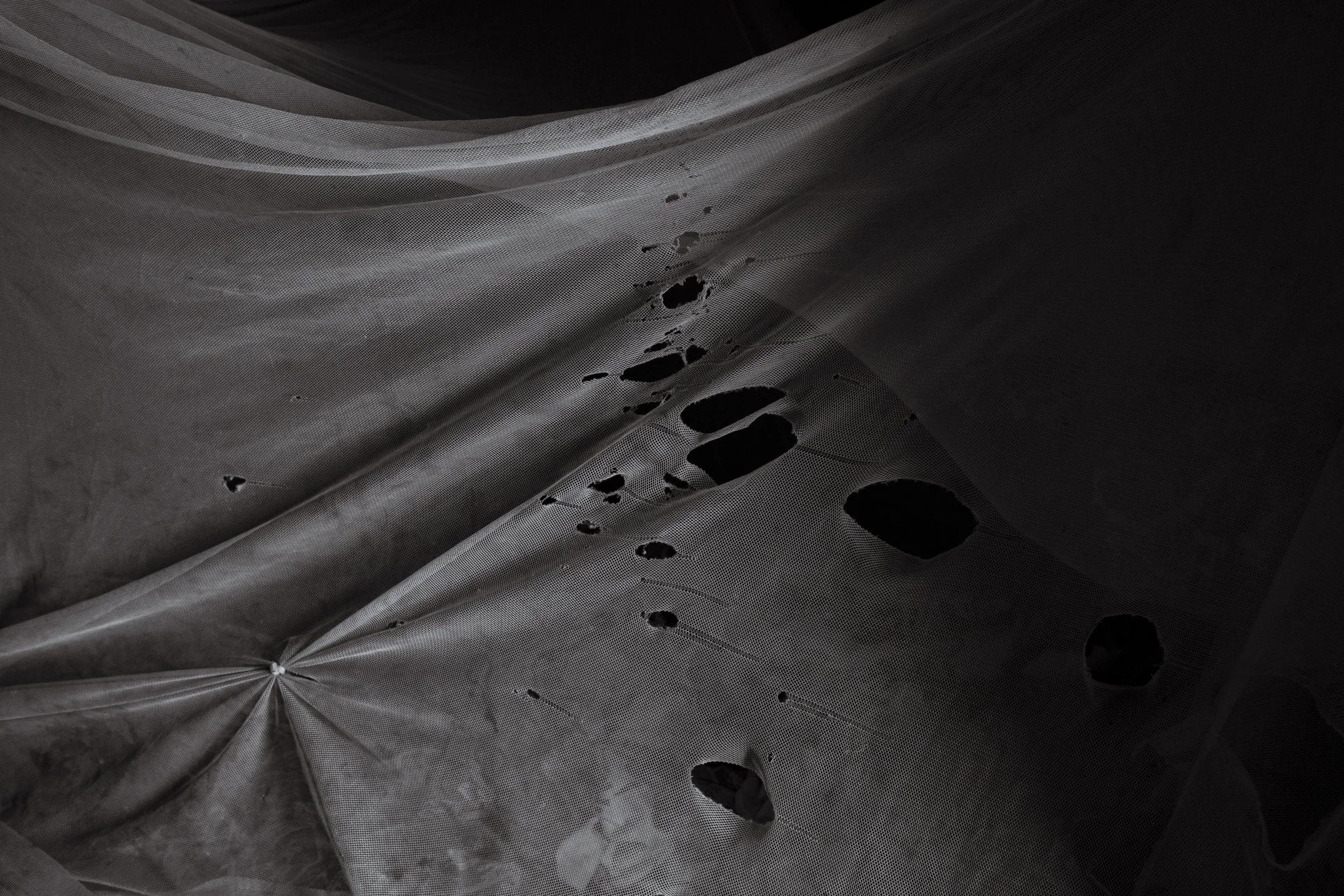
27 February 2020. Obur, Soroti District, Uganda. Ineffective Mosquito nets, such as this one in the room lived in by thirteen-year-old Silus Odaii who lives with Down Syndrome, enable the spread of malaria which further fuels the health issues faced by many subsistent rural Ugandans, especially those with pre-existing disabilities. The inconvenience of travelling long arduous distances to reach the major cities health services often means local, private health services are used. The private health operators far outweigh the governments public services - 95% private, 4% public - yet a lack of regulation means quality of care is often poor.
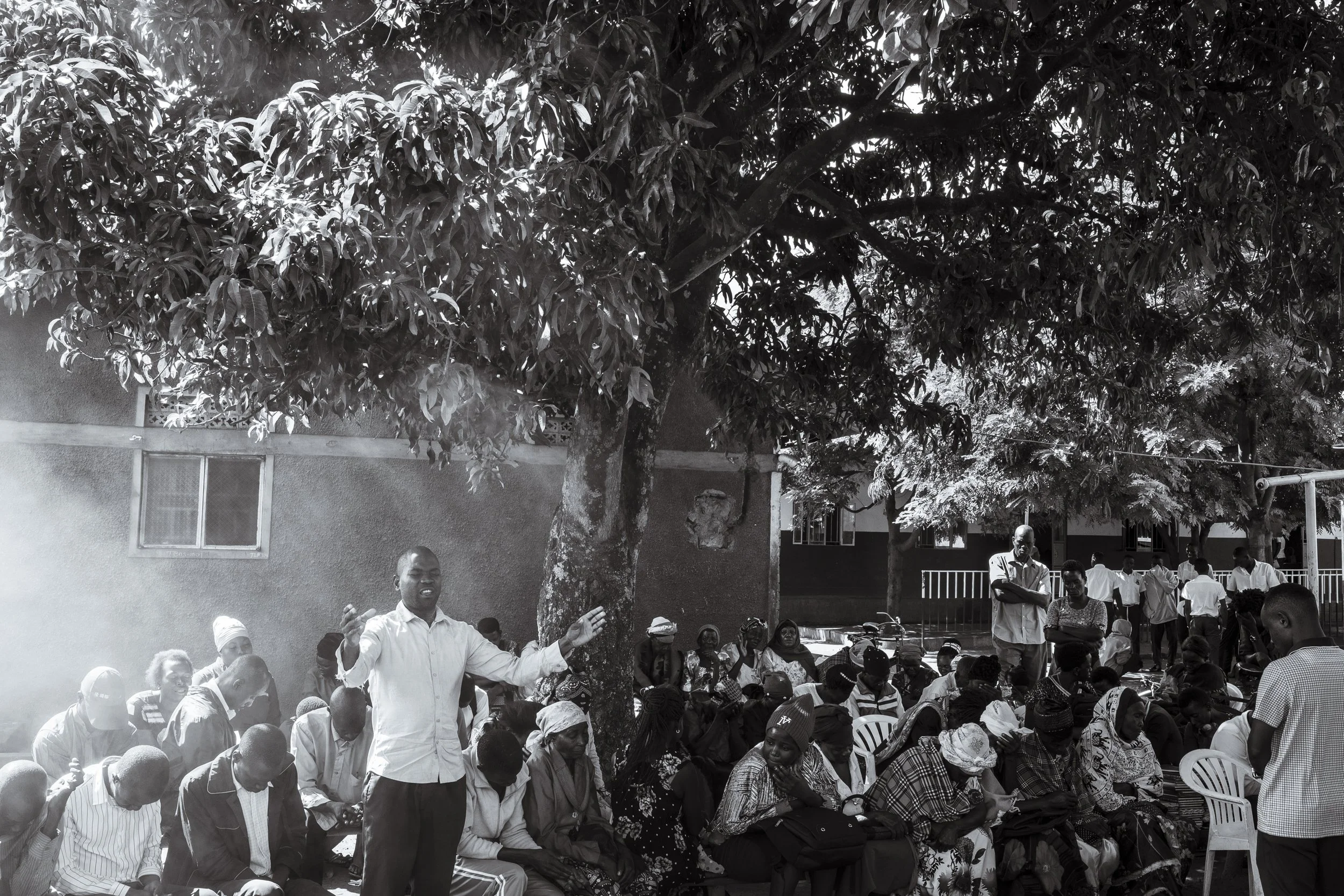
29 November 2024. Buwenge, Uganda. A local participant in a community outreach program says a prayer for those living with epilepsy who have congregated under a Mango tree to receive education and medical supplies. This outreach program, run by Stephan Kigozi of Home of Hope, provides free medication for epileptics. Epileptics bear a great deal of the ingrained cultural taboo due to society's perception of its seizures representing 'possession' by evil spirits. The outreach also provide an education and awareness service which aims to educate its participants about disability which enables those in attendance to further educate neighbours back in their home villages, spreading truth about disability that is not reached in rural areas by Government programming.
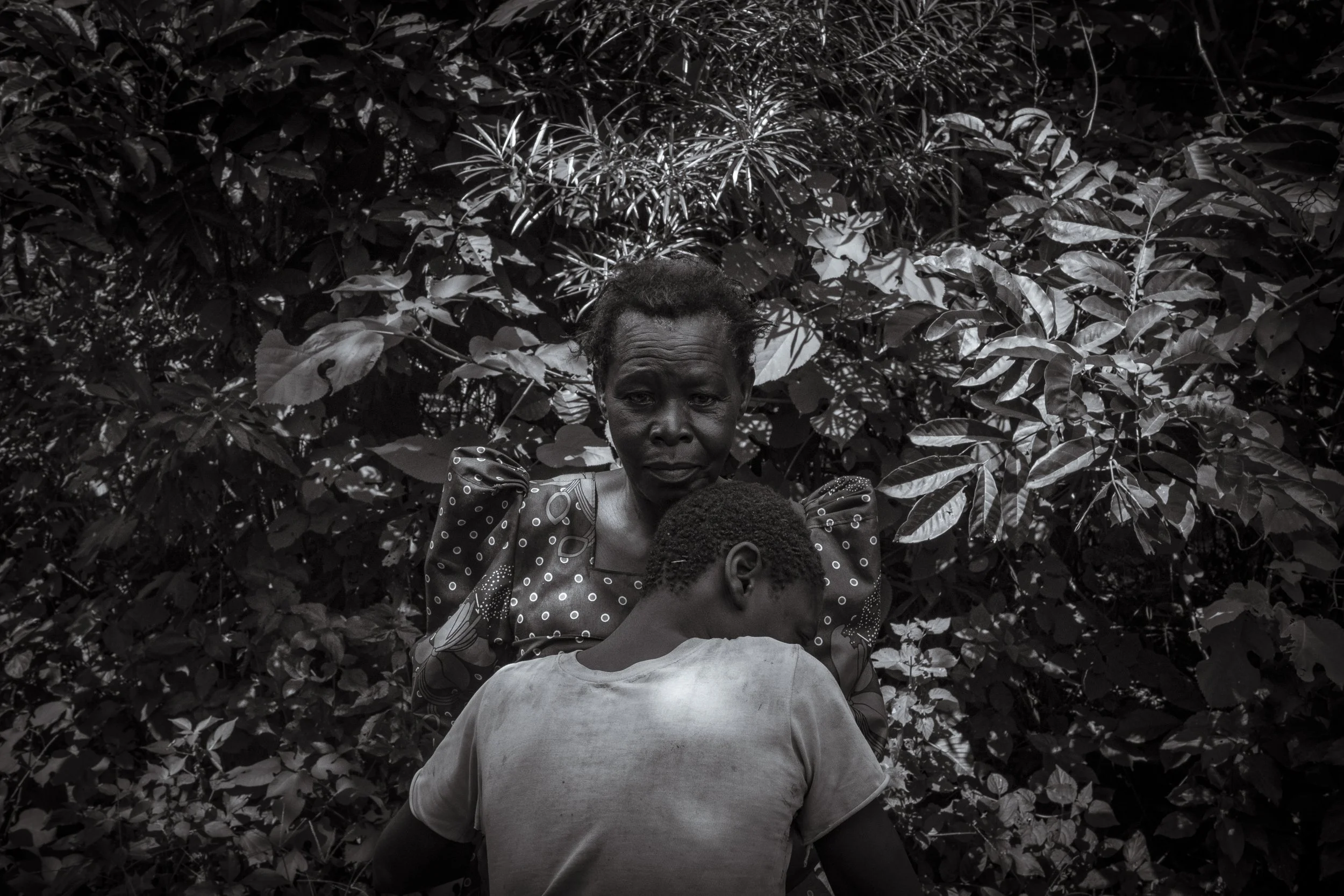
19 July 2023. Nabwigulu, Kamuli District, Uganda. Perez Mbwase cuddles into his mother Lovinsa Namwebya's bosom after being admonished for misbehaving.
Due to his Autism, hunger is a trigger for Perez' mood to swing towards aggression. After walking for over two hours so Lovinsa could inspect a potential plot of land to plant vegetables Perez didn't eat, causing him to act out. Namwe tried for years to have her son’s condition diagnosed. Unable to deal with his aggression and hyperactivity, his parents tied him to a tree for 11 years. He was fed and toileted in the same place until late evening when he would join the family inside. Following the death of his father from suicide, Lovinsa struggled to care for Perez alone and he was moved to the Amaanyi Centre. While there he was formally diagnosed with severe, category four, Autism. During his time at the Amaanyi Centre Perez would learn basic skills such as dressing himself and eating with cutlery. Almost as importantly, the staff would educate Lovinsa around Autism. She would be taught what Autism is, how it manifests in Perez and what his triggers are. This education would lead to a tighter bond between mother and son and provide Lovinsa with the tools she needed to properly care for her son.





























